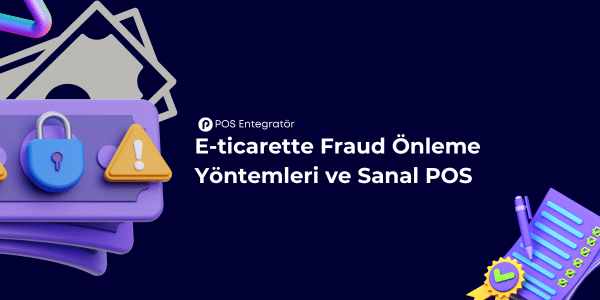Fraud Prevention Methods in E-commerce and Virtual POS

Fraud can cause serious financial losses for both consumers and businesses. In this article, we will discuss the types of fraud in e-commerce, how these risks can be prevented and what role virtual POS plays in this process.
Table of Contents
Fraud Types
The most common types of fraud in e-commerce are the following:
- Identity Theft: Purchases made using fake credentials. Fraudsters make purchases by obtaining the credentials of others and opening fake accounts or accessing existing accounts.
- Card Fraud: Transactions made with stolen or counterfeit credit cards. This type of fraud is committed with physically stolen cards or with card details obtained over the internet.
- Chargeback Fraud: Unjustified refusal of a transaction after the customer has received the product. Customers can request a transaction refund without returning the product or continuing to use the service.
- Phishing: Deceptive emails and websites designed to obtain users' sensitive information. Fraudsters try to obtain users' critical information such as passwords, card details, etc. through fake sites or emails.
Fraud Prevention Methods
The main measures that businesses can take to prevent fraud are as follows:
Authentication and Security Layers
3D Secure: The additional layer of security offered by card providers such as Visa and MasterCard. This system requires an additional password to be entered to verify the identity of the cardholder during the transaction. SMS Verification: Sending one-time passwords via SMS for transaction confirmations. This method increases transaction security with a code sent to the customer's phone.
Address Verification System (AVS)
AVS: Systems that check whether the customer's billing address and credit card address match. This method helps to determine whether the owner of the card is actually the person making the transaction.
IP Address Tracking
Geographical Adaptation: Check whether the customer's IP address and billing address are in the same region. Transactions from different regions may be considered suspicious. VPN and Proxy Detection: Fraud prevention by identifying spoofed IP addresses. Users using a VPN or proxy are scrutinized more carefully for suspected fraud.
Risk Scoring and Artificial Intelligence
Machine Learning: Algorithms that detect suspicious transactions by analyzing transaction history and customer behavior. These systems can assess the risk of fraud by identifying deviations from the norm. Risk Scoring: Systems that score the fraud risk of each transaction. Transactions with a high risk score require additional verification.
SSL Certificates and Firewalls
SSL Certificate: Data encryption to ensure the security of websites. This protects customer information from access by third parties. Firewalls: Software and hardware that prevents unauthorized access. This monitors network traffic and blocks suspicious activity.
The Role of Virtual POS
Virtual POS plays a critical role in the fraud prevention process:
- Advanced Security Protocols: Virtual POS providers protect customer data using PCI DSS compliant security protocols. These standards ensure compliance with security guidelines set by the payment card industry.
- Fraud Detection Systems: Most virtual POS offer AI-based fraud detection and prevention systems. These systems enable rapid response by identifying abnormal transaction patterns.
- Real Time Monitoring: Monitor transactions instantly, enabling you to detect and respond to suspicious activity immediately. This helps stop fraud attempts before they happen.
- Card Storage Features
Additional Precautions and Tips
Customer Trainings
Awareness Campaigns: Raising awareness of customers by informing them about fraud methods. Secure Password Usage: Guiding customers to use strong and unique passwords.
Regular Security Updates
Software Updates: Implement regular security patches and updates to the website and payment systems. Penetration Tests: Conduct regular security tests to identify vulnerabilities.
Collaborations and Audits
Cooperation with Financial Institutions: Reducing the risk of fraud through close cooperation with banks and payment providers. Independent Audits: Regularly check the security of systems through third party security audits.
Preventing fraud in e-commerce is vital both to ensure customer safety and to prevent financial losses for businesses. Virtual POS solutions offer important support in this process with advanced security measures and fraud detection systems. Businesses need to create a secure shopping environment by utilizing these technologies.
To read the article on Virtual POS security click.











